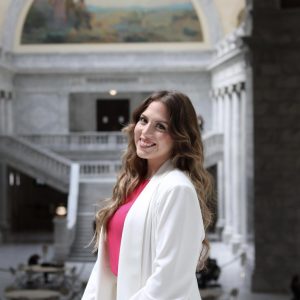
Congratulations to the Class of 2021. We know how difficult this past year has been for all of us and we are so impressed with the strength, courage and ambition all of you have expressed as you’ve navigated your last year. In honor of Financial Literacy Month, we at the Financial Wellness Center want to give you a financial wellness checklist of things to consider when applying for a new role upon graduation.
1. Be strategic about your career choice
Now that you have graduated, you might find yourself in need of some guidance for your next steps. Alumni who graduated from the U less than two years ago still have full access to the resources in the Career & Professional Development Center, including access to all of their career coaches, career fairs, Handshake job and internship platform, events and programs and so much more. Take advantage of these resources that are FREE for you.
2. Contribute to retirement savings
It is never too early to start thinking about retirement. In fact, the earlier the better. Consider opening up a Roth IRA or contributing to your employer-sponsored retirement account if they offer one. The great thing about Roth IRAs is you can take out the contributions and earnings tax-free once you reach the eligible retirement age.
3. Opt into a health insurance plan
Ah yes, health insurance. After 22 years on this planet, I still can’t wrap my head around the way health insurance works. Maybe you feel the same way. If so, check out this great understanding health insurance website that gives a comprehensive overview of health insurance and ways to choose the correct plan that is structured for you.
4. Figure out your why
You just landed your dream job. Now what? I’ll give you a hint, it starts with S.A. and ends with V.E. SAVE, SAVE, SAVE. But wait, before you start saving, you need to ask yourself the following questions: Who am I saving for? What am I saving for? Why is it important to me? Once you figure out the answers to these questions, it will be easier to set aside money because you are doing it for a specific reason. Since your savings goals often align with your personal and financial goals in life, it is important to be aware of your why. Check out this free quiz where you can find out what your inner, social, physical and financial values are.
5. Create an emergency fund
There are several different types of saving accounts you can open depending on your financial goals, but one of the most important account everyone should open is an emergency savings account. How much you should have is relative to your situation. Start off with $500 and slowly increase it until you eventually have three-to-six months’ worth of expenses. Visit your financial institution and ask them what kind of saving accounts they offer. Are there any monthly fees you need to watch out for? Is there a minimum amount of money you need to keep in the account? If there is anything you need to watch out for, it’s definitely those hidden fees, so take this into consideration: Never and I mean never, pay monthly fees for a savings account. If your bank or credit union is charging you a monthly fee for your savings account, it might be time to start looking into a new financial institution.
6. Be kind to yourself
Remember to take time for yourself and ask for help if you need it. Your physical, mental and emotional wellbeing is crucial in order to succeed. Take this time to check in with yourself since most important thing any of us can do for ourselves is to take stock and prioritize our well-being. Post-graduation can be stressful and scary, but we are here to help U. Good luck, you’ve got this.
The Financial Wellness Center provides a competent and confidential atmosphere where current students, alumni, staff and faculty can have access to free accredited counseling services, quality financial education and appropriate tools to achieve lifelong successful financial outcomes. Visit our website to schedule an appointment to learn more.
